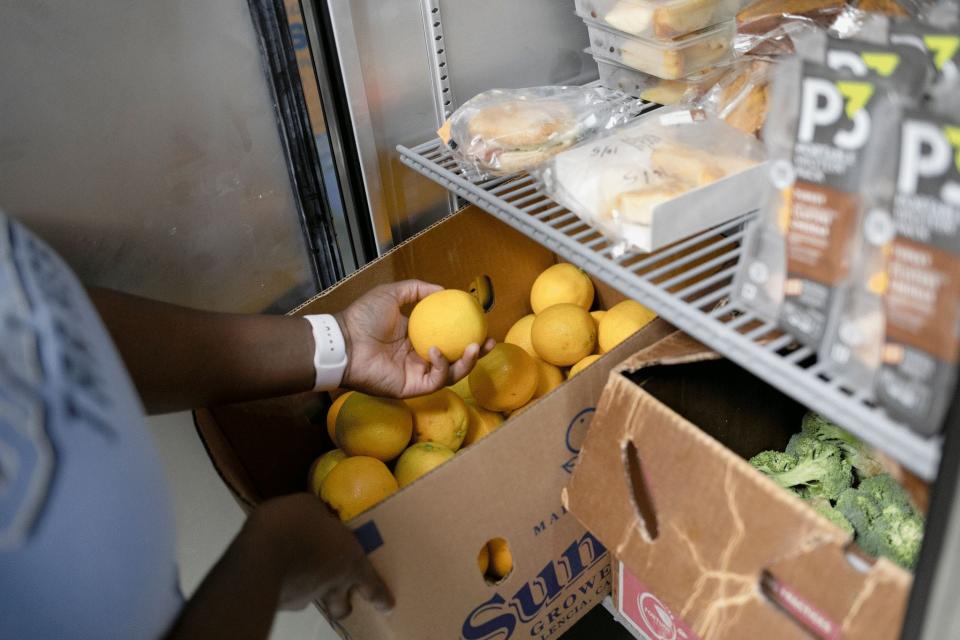On a blistering-hot June day in Birmingham, Alabama, Elena Vasquez Garcia sautéed chicken and bell peppers over the stove, ingredients for tacos topped with “expensive” avocados for her three children at home, after she’d spent the week at a food pantry catering to community members who can’t afford meat, milk and produce.
Feeding four people is especially difficult for her, as a single mom to three kids. Vasquez Garcia takes home about $500 a week and spends about half of it at the grocery store.
When her children – 15, 18 and 22 – are home all summer, “They’re bored and eat everything in sight,” she said. She’s barely scraping by, but would rather keep the healthy meals coming than deprive her kids. One of them is heading to college in the fall, which will offer some financial relief, she said, “but it shouldn’t be that way.”
Money for food is especially tight for families in Alabama and 11 other states where Republican officials declined to participate in a new federal food assistance program meant to curb the needs of school families this summer.
Summer EBT, or electronic benefits transfer, is the first new federal food assistance program in nearly half a century. The SUN Bucks program grants $120 per eligible child to be used during the summer months, leveraging existing programs including pandemic-era funding. Kids are eligible if they qualify for free or reduced meals during the school year. Families can use the money in addition to other government food benefits.
The governors of a dozen states – Alabama, Alaska, Florida, Georgia, Iowa, Mississippi, Oklahoma, South Carolina, South Dakota, Texas, Utah and Wyoming – opted out of the program, leaving about 9.5 million students without the aid this summer, according to the United States Department of Agriculture. All of these states are led by Republicans, who have said they oppose welfare, the administrative burden of overseeing food benefits and what they call overreach by the federal government. All but two of the six states with the highest rates of food insecurity opted out of the benefits. The two exceptions, whose Republican governors accepted EBT, are Arkansas and Louisiana.
Among Republican leaders, there’s debate about the extra federal cash for food. Nebraska Republican Gov. Jim Pillen has said the program is “just another form of welfare … and it’s not doing our kids any good” whereas Gov. Sarah Huckabee Sanders, an Arkansas Republican and former Trump administration official, described it as “an important new tool to give Arkansas children the food and nutrition they need.”
The White House has said the federal program is a critical addition to existing food assistance programs since state and local options rarely reach all families in need.
But the benefits this summer are only accessible to children in participating states. Millions won’t be able to use them.
Mike Lewis, a spokesman for Alabama Gov. Kay Ivey, has said the state opted out of the program because of the cost of administering the program. To Vasquez Garcia, who works at a food pantry, it feels like these governors want to “keep the poor extremely poor.”

What makes food insecurity worse? When everything else costs more too, Americans say
The summer EBT program was meant to be a ‘game-changer’ in fighting hunger
U.S. Agriculture Secretary Tom Vilsack called the new federal food assistance program “a proven game-changer” in combating child hunger. He said the program would help officials close the gap in summer hunger families experience.
The most recent data from the U.S. Department of Agriculture shows more than 44.2 million people nationwide experience food insecurity in the U.S., including 13 million children. The department defines food security as having “access at all times to enough food for an active, healthy life.” Arkansas, Louisiana, Oklahoma, Mississippi, Texas and South Carolina have the highest prevalence of food insecurity, according to recent USDA data.
White House leaders slammed state officials, including Florida Gov. Ron DeSantis, who refused to opt in and help combat hunger for parents who can’t afford to feed themselves or their children.
“It is $250 million that is left on the table. … It costs Floridians nothing,” said White House press pecretary Karine Jean-Pierre to Spectrum News. Tori Cuddy, a spokesperson for Gov. DeSantis’s office, said the state opted out because officials there “anticipate that our state’s full approach to serving children will continue to be successful this year without any additional federal programs that inherently always come with some federal strings attached.”
What is food insecurity? More than 44 million Americans experience it every year.
More and more families are showing the need for food assistance
Food insecurity is skyrocketing at the food pantry where Mary Liz Ingram works with Vasquez Garcia in Birmingham, Ingram said.
The Trinity United Methodist Church is running a drive-up food pantry program with food donations from local grocers and about 200 volunteers to help distribute the goods to families, but Ingram is anxious about whether it is sustainable.
Need at the pantry usually peaks in the winter and declines in the summer. But the trend is bucking this summer.
There’s about a 30% increase in need, Ingram said, with 500 families accessing the food pantry on average. The reason for the increase, she said, is families need additional government help because food prices are rising and more refugees are resettling in Alabama and need food assistance.
“This is terrible timing. It also leaves the burden on nonprofits to support those families. And that kind of stinks,” she said. “I’m thinking ‘Oh my gosh, I want to be there for families and don’t want to say we’re full.'”
Vasquez Garcia said she could also use the help. She waits until the families who visit take their picks and then chooses from the leftovers for her kids.
Contact Kayla Jimenez at [email protected]. Follow her on X at @kaylajjimenez.
This article originally appeared on USA TODAY: Millions of hungry kids are denied access to summer EBT program
Source Agencies

